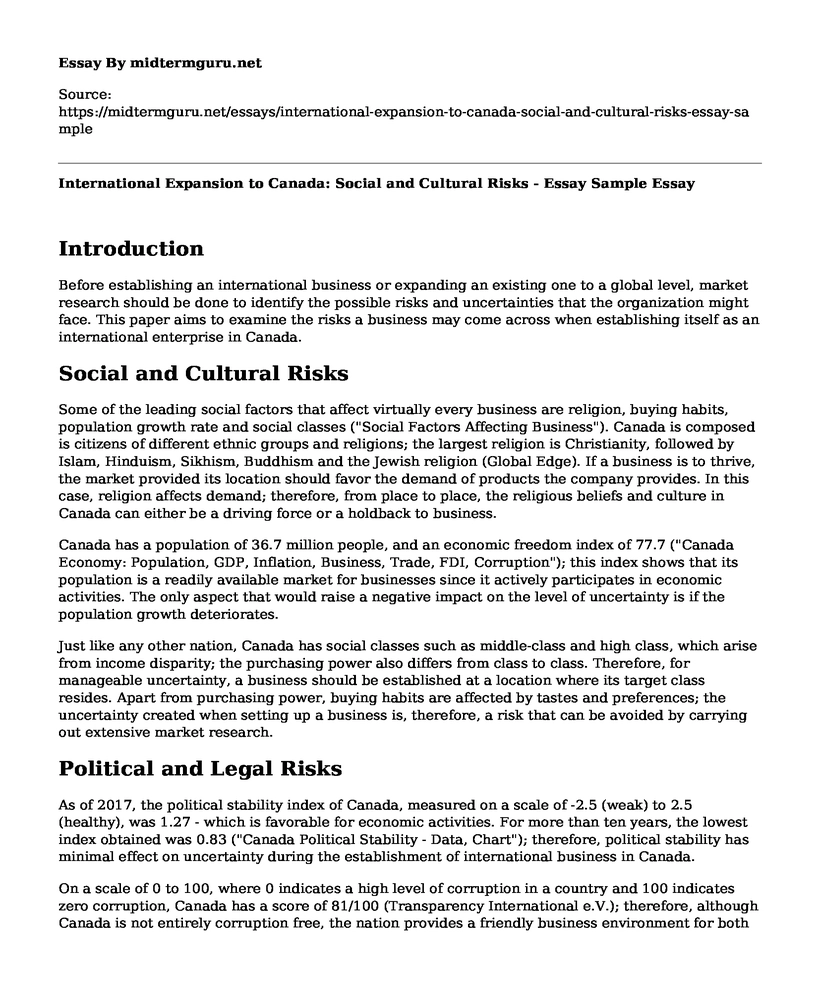Introduction
Before establishing an international business or expanding an existing one to a global level, market research should be done to identify the possible risks and uncertainties that the organization might face. This paper aims to examine the risks a business may come across when establishing itself as an international enterprise in Canada.
Social and Cultural Risks
Some of the leading social factors that affect virtually every business are religion, buying habits, population growth rate and social classes ("Social Factors Affecting Business"). Canada is composed is citizens of different ethnic groups and religions; the largest religion is Christianity, followed by Islam, Hinduism, Sikhism, Buddhism and the Jewish religion (Global Edge). If a business is to thrive, the market provided its location should favor the demand of products the company provides. In this case, religion affects demand; therefore, from place to place, the religious beliefs and culture in Canada can either be a driving force or a holdback to business.
Canada has a population of 36.7 million people, and an economic freedom index of 77.7 ("Canada Economy: Population, GDP, Inflation, Business, Trade, FDI, Corruption"); this index shows that its population is a readily available market for businesses since it actively participates in economic activities. The only aspect that would raise a negative impact on the level of uncertainty is if the population growth deteriorates.
Just like any other nation, Canada has social classes such as middle-class and high class, which arise from income disparity; the purchasing power also differs from class to class. Therefore, for manageable uncertainty, a business should be established at a location where its target class resides. Apart from purchasing power, buying habits are affected by tastes and preferences; the uncertainty created when setting up a business is, therefore, a risk that can be avoided by carrying out extensive market research.
Political and Legal Risks
As of 2017, the political stability index of Canada, measured on a scale of -2.5 (weak) to 2.5 (healthy), was 1.27 - which is favorable for economic activities. For more than ten years, the lowest index obtained was 0.83 ("Canada Political Stability - Data, Chart"); therefore, political stability has minimal effect on uncertainty during the establishment of international business in Canada.
On a scale of 0 to 100, where 0 indicates a high level of corruption in a country and 100 indicates zero corruption, Canada has a score of 81/100 (Transparency International e.V.); therefore, although Canada is not entirely corruption free, the nation provides a friendly business environment for both local and international organizations. Low level of corruption increases an organization's confidence in its employees, the government, and its ability to generate favorable profits since the fair allocation of tenders and taxation will be done. In conclusion, the corruption index in Canada causes a manageable level of uncertainty, which is convenient for sound decision making by the business organization's management team.
The federal government of Canada has several business regulation laws, which might resort in regulatory uncertainty; therefore, business policies are prone to change due to change in government policy. One of these regulations is required labeling, which holds that every consumer good in Canada must be labeled in both French, which is the official language, and English. The labeling policy, especially on foods, affects the buyer's purchasing decision since it allows buyers to see the specification of a commodity before they make buy it. The other regulatory policy in Canada is the tariff classification policy, which favors imports from some nations and not others ("Doing Business - Tariffs and Regulations - Canada - For Australian Exporters").
Therefore, if Canada's tariff policy does not favor the imports made by an international business, a detrimental uncertainty will be generated. The third regulation by the Canadian government is the foreign ownership restriction policy, which controls how foreigners can earn ownership of assets that were previously owned by Canada. If the regulatory system does not favor foreign ownership, there will be a high level of uncertainty on if foreign investors should choose to establish an international business in the country or not.
Reference
"Canada Economy: Population, GDP, Inflation, Business, Trade, FDI, Corruption." The Heritage Foundation, 2019, www.heritage.org/index/country/canada. Accessed 25 Apr. 2019.
"Canada Political Stability - Data, Chart." TheGlobalEconomy.com, m.theglobaleconomy.com/Canada/wb_political_stability/. Accessed 25 Apr. 2019.
"Doing Business - Tariffs and Regulations - Canada - For Australian Exporters." Austrade, Australian Government - Austrade, www.austrade.gov.au/Australian/Export/Export-markets/Countries/Canada/Doing-business/Tariffs-and-regulations. Accessed 25 Apr. 2019.
Global Edge. "Canada: Your Source for Global Business Knowledge, globaledge.msu.edu/countries/canada. Accessed 25 Apr. 2019.
"Social Factors Affecting Business." PESTLE Analysis, 25 Feb. 2015, pestleanalysis.com/social-factors-affecting-business/.
Transparency International e.V. "Canada." Transparency International - The Global Anti-Corruption Coalition, www.transparency.org/country/CAN#. Accessed 25 Apr. 2019.
Cite this page
International Expansion to Canada: Social and Cultural Risks - Essay Sample. (2022, Dec 28). Retrieved from https://midtermguru.com/essays/international-expansion-to-canada-social-and-cultural-risks-essay-sample
If you are the original author of this essay and no longer wish to have it published on the midtermguru.com website, please click below to request its removal:
- Improvement of Safety of the Water Sources With Examples - Ecology Paper Example
- Research Paper on Teamwork
- Paper Example on Increased Communication: Positive and Negative in the Social Networking Era
- Essay Sample on Understanding Someone Else's Perspective
- Paper Example on Critical Decision Making for Providers
- Unlocking Human Behavior-Organizational Performance Link - Essay Sample
- ABO Blood Group Org Establishes Brand Value to Meet Clients in Aus - Essay Sample







